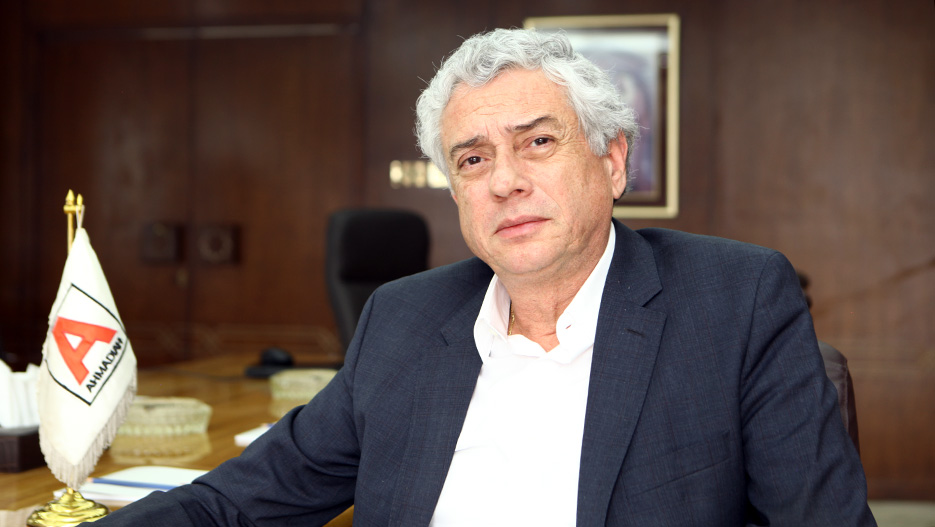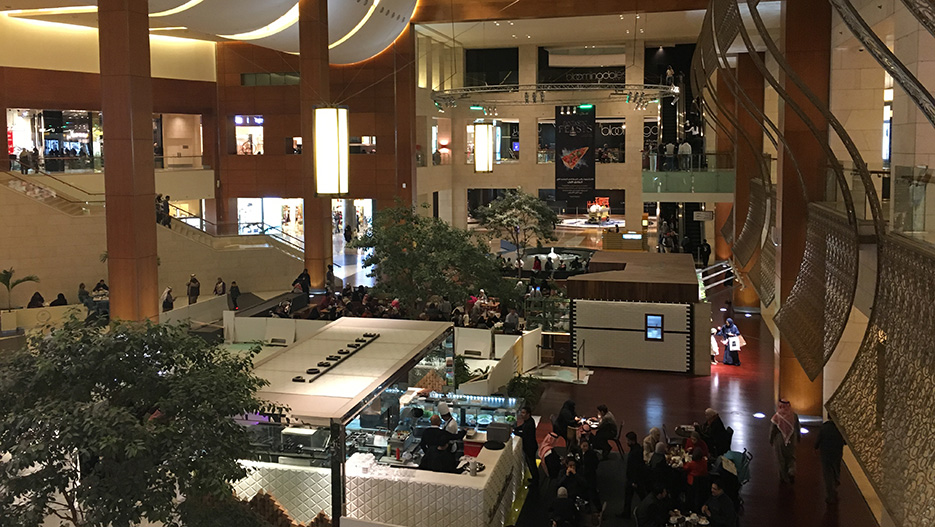Fast Track Construction Projects Contractor in Kuwait: Ahmadiah Contracting
“We are known to work on fast track, design development projects. We started that process back in the 70s with one of the real estate companies called Salhia Real Estate. We did the Salhia Mall that is still considered to be the mall with a very large number of prime brands like Louis Vuitton and others.”
Interview with Elie N. Hani, Deputy CEO of Ahmadiah Contracting

Kuwait did not go through the boom that the GCC countries went through. Kuwait was always moving at a relatively modest pace in the construction phase. Kuwait has a democracy, we have lots of controls, there is a completely elected parliament, and the parliament is quite powerful and they have questioned lots of projects. The result has sometimes been to delay the projects and also in that the government is an overlooking eye on what is going on. The good thing is that Kuwait still has a long way to go and despite the crisis of 2008, Kuwait’s growth has continued. Today we find ourselves the best GCC country in terms of continuity of construction projects; in fact they have expanded in the last two years as the government decided to move ahead with some cultural projects like the Kuwait Cultural Centre with its Opera House and other projects like the collection of museums that is being built now. They are also catching up on hospitals and roads and they are starting the new refinery project: the Clean Fuel project. So I believe that in the construction sector Kuwaiti growth has been steady and frankly better performing than all of the surrounding GCC countries.
Kuwait has always been an open country for all contractors. We have had a wave of Eastern European contractors in the 70s and 80s then we had Korean contractors and then Chinese and Turkish contractors then Indian, Malaysian etc. So local Kuwaiti contractors had to compete against all of these international ones. Many of the international contractors lost money but for the Kuwaiti contractors they lost jobs, they were not able to take the jobs that were under-priced by these internationals. However, there are a healthy number of local contracting firms that were able to survive and that are well positioned and that can compete against the international companies when there is no price undermining. I think we take pride in the Kuwaiti construction sector. They are capable of doing very difficult jobs with a lot of local expertise here in Kuwait.
Ahmadiah Contracting is the number one company when it comes to construction projects in collaboration with the private sector.
We are known to work on fast track, design development projects. We started that process back in the 70s with one of the real estate companies called Salhia Real Estate. We did the Salhia Mall that is still considered to be the mall with a very large number of prime brands like Louis Vuitton and others. With that same company we are still doing projects today. All of the projects are fast track. We help in design development, value engineering and in building the projects. This is one of our real estate clients. Other real estate clients are Tamdeen Real Estate with whom we starting working with in the 90s and up to today we have had an almost continual flow of work with them. We are doing shopping malls and hotels. Others are United Real Estate and now we are working with Almabani General Contractors on the Avenues projects. We are doing phase 4 of the Avenues.
We positioned ourselves because we were able to establish a relation of trust with all of our clients, they know that when we work with them we take their interests as a primordial aim and that is why we have repeat clients. I believe that we are by far the Kuwaiti contractor with the majority of fast track, design build type of projects with the private sector.
I believe that we are by far the Kuwaiti contractor with the majority of fast track, design build type of projects with the private sector.
Could you talk about the projects that you are looking at now for 2017?
Projects that are under execution with the private sector include a 300,000m2 commercial development in the south of Kuwait called the Al Kout project. This is a retail project connected to a hotel we had built a few years back called the Rotana Hotel, connected to another mall that we had built in early 2007. We are starting a new project called the Kuwait International Tennis Complex, I believe it will be a landmark for the international Tennis Federation because it is extremely luxurious, there is going to be a total of 18 tennis courts and 2 arenas, one that is covered and with capacity for 4,000 spectators and the other with capacity for 1,500 spectators, a hotel of 330 rooms, and a shopping mall which is connected to another shopping mall. It is a really high end facility. This is under construction and will be completed by the end of 2018. We are working on the Avenues Phase 4, it is around 480,000m2, with 2 hotels—one 5 star and one 4 star—and it is well under way and will be operational next year. We have started a new project along the same lines with Salhia Real Estate doing a multiuse complex that is 380,000m2 and entails of a hotel, office towers, residential towers, shopping mall and the like. These are some of the projects we are working on and we are doing some infrastructure for a new interesting development called Hessa Al Mubarak Project. We are doing the infrastructure on a plot of land which is 220,000m2. It is going to be a complete community of residential speciality buildings for clinics and lawyers and what have you, with a shopping area for the residents with bicycle paths in between and bridges for the residents. We have started to work on the infrastructure for it. All of these projects I have mentioned are with the private sector.

What about the NBK Tower?
The NBK Tower was a competition, we competed against large international firms and the likes of Samsung, B6 and CCC, and we were the lowest bidder so we are working on it. It was a normal competition project rather than a fast track, design build type of project.
You have recurring clients because they come back to you through the trust that you have created over the years. Could you talk about the philosophy and values behind Ahmadiah Contracting?
Ahmadiah Contracting was created by the late Abdulatif F. Al Thuwainy, and the late Nagib Ibrahim Najjar, a Lebanese engineer who came to Kuwait in 1954 and together with Mr Al Thuwainy they decided to create this company. They both set the values by which the company should run. Honesty was the primordial value. Words said by any of the founders or any of the second generation stands as good as a contract. We have the mentality that we have a reputation to keep. Our reputation is frankly a top priority for us; it is not the amount of money you can generate per year, rather it’s the reputation that you need to keep. It is by delivering the product to our clients on time, on quality and without having any conflict of interest between what the clients’ needs are and what we need. We always put the clients’ needs first even sometimes at the expense of our own interests because we believe that we are here to serve the client and fulfil a certain level of purpose and we work very hard to do that. The result of this is that we have a very high employee retention rate, even in the boom years when we were well positioned by the landmarks we created in Kuwait and so many companies were getting new jobs and looking for people and so they would come and try to lure our engineers out of the company by offering sometimes double salaries and so forth. We lost very few and probably those who left were not following our philosophy. We take pride in that. We take pride in working for this organisation. That pride is one of the driving engines of Ahmadiah.
You set up as two families together, are you looking for investors for joint ventures?
Investors are one thing and joint ventures are another. A joint venture is participation on a specific project, and we are of course open to joint ventures. Sometimes we don’t have the necessary knowhow to do a certain type of work for example let’s say we are talking about solar farms for example, we are not specialists in solar energy, so we would do a joint venture with someone who is a specialist in that field. We did a project with KNPC for an effluent treatment plant, taking all of the refuse waters and oils from all the refineries and treating them to standards that are beyond those set by the EPA to discharge refuse. We did a joint venture on this with people who have this knowhow. But to have partners or investors in the long term is not our aim for the time being.
What is your vision for the company in three years?
We are trying to diversify and we are diversifying into similar types of activities. We have a company specialised in deep foundations and we have a company specialised in facility management. We are always looking for opportunities where we can develop further. We are very much interested in renewable energy. We know that the future is in renewable energy, and we understand the challenges today of solar use in a country like Kuwait where the issue of dust and haziness doesn’t really help in creating solar farms. But as you have seen, the cost of solar has dropped drastically everywhere. In the States a year ago for the first time a private company bid for solar energy at a rate competitive of that of gas generated electricity. It is happening in the area. We have an interest in developing further in that field. We know that Kuwait has a challenge and that is public housing. We are interested in developing some kind of association between financial engineering and contracting firms to propose solutions to the public housing issue. We are trying to push into new fields that we believe are up and coming and taking predominance in this part of the world.
How do you aim to achieve all of these goals? Do you have a clear strategy?
Both relate to government relations of course, it depends of the strategy of the government to develop renewable energy, or to involve the private sector in the building of public housing. We see a trend in the government to move towards these two fields in a positive way involving the private sector. Of course we are readying ourselves to be there when the legislation will allow for moving into this direction.
FAIR USE POLICY
This material (including media content) may not be published, broadcasted, rewritten, or redistributed. However, linking directly to the page (including the source, i.e. Marcopolis.net) is permitted and encouraged.